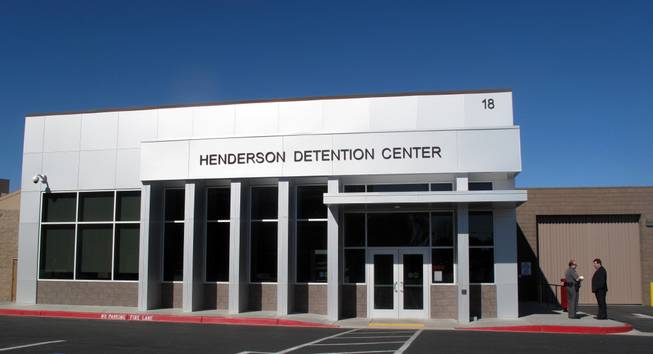Friday, Aug. 30, 2013 | 2 a.m.
Related content
For Henderson Detention Center guards willing to put in the hours, 2012 proved to be a lucrative year. And no one knew that better than corrections officer Michael Ramseyer.
With the jail brimming with inmates and the staff short several officers because of resignations or transfers, there were plenty of extra hours waiting for the guards — at an overtime rate of 1.5 times base pay. They cashed in to the tune of $668,000, an average of about $9,000 for each of the 73 officers who worked there last year, according to local salary data collected by the Sun.
Ramseyer was the department's top overtime earner. He logged an extra 1,438 hours in 2012, about 27 hours a week on top of the normal 40-hour week, on his way to collecting $84,166 in overtime. Ramseyer’s overtime pay was the highest of any public employee in Henderson, North Las Vegas, Las Vegas, Clark County and Metro Police.
Ramseyer, through Henderson spokesman Keith Paul, declined to be interviewed for this story.
The overtime pay Ramseyer earned nearly equaled his annual salary of $87,089. The $84,166 was more than double the overtime pay of any other corrections officer at the Henderson jail, which divvies up extra shifts on a first-come basis.
Ramseyer’s overtime was the equivalent of nearly 180 extra eight-hour shifts. Had Ramseyer spread his hours evenly over the course of 2012, he would have averaged 9.6 hours of work each day of the year.
But his case is an exception among public employees in the valley, two-thirds of whom don’t earn any overtime pay.
Overall, local municipalities’ overtime spending pales in comparison to the billions in costs for employee salaries and benefits. The nearly $60 million spent on overtime in 2012 among the municipalities is a tiny fraction of a government’s overall budget.
Still, without careful monitoring, officials say, overtime costs can spiral out of control, and in these lean times, governments are setting caps and looking at other ways to limit how often they have to pay employees at a time-and-a-half rate.
“Overtime is relatively small as compared to wage and benefits, but it can get away from you quickly if you don’t have strong safeguards against that,” said Commissioner Steve Sisolak, who pushed for an investigation into excessive overtime in the Clark County Fire Department in 2010. “If you need that much overtime, is it a matter of being inefficient during the normal hours, or are we short of people?”
The amount of overtime for corrections officers at the Henderson Detention Center didn’t raise any eyebrows at the police department and was in part expected, Paul said, because of staffing vacancies at the jail.
“There were a number of vacancies at the detention center that required the shifts be filled through use of overtime,” Paul said. “(Ramseyer) signed up and worked a lot of the overtime that was available.”
Henderson corrections officers, whose annual base salaries range from $54,000 to $84,000 before longevity pay, work a combination of 12- and eight-hour shifts on their way to a normal 40-hour workweek. Paul said employees must take off at least eight hours between shifts. Managers are responsible for making sure an employee’s extra hours aren’t taking a toll on performance or the department’s budget.
The department is in the process of hiring five new corrections officers, which would bring the jail up to full staff, Paul said, but in the meantime, mandatory staffing levels for the round-the-clock operation have kept the availability of extra shifts high.
“We can’t just turn out the lights and say, ‘See you guys in the morning,’” Paul said. “There’s minimum manning they have to have to ensure the safety — not only of correction officers but also the inmates.”
The jail also is teeming with hundreds of inmates from Immigration and Customs Enforcement and other federal agencies through a contract that generates $11 million per year for the city, further driving up demand on corrections officers’ time.
The factors driving up overtime spending at the Henderson jail can be found in varying degrees at police and fire departments throughout the valley, which receive the vast majority of overtime pay from local governments.
Unlike an administrator or engineer, when a police officer or firefighter shift comes open because of vacation or sick leave, someone must be called in — and must be paid an overtime rate for shifts that can last up to 24 hours — to ensure minimum staffing levels are met.
In the case of Clark County firefighters, who were at the center of a sick-leave and overtime abuse scandal in 2010, being called in for overtime often means a chance to work a 24-shift at the increased rate. It also allows them to accrue overtime pay faster than a desk worker filling in for an eight-hour shift.
Clark County firefighters work five 24-hour shifts every 16 days and are eligible to receive overtime whenever they’re called in on an off-day, though often it’s only for a few hours at a time, said Yolanda King, assistant county manager.
After accusations that firefighters were gaming the sick-leave system to drive up their overtime hours, the county instituted several new policies, including that any firefighter who calls in sick more than five days in a year must provide a doctor’s note. It also shifted several positions to allow for more rank-and-file firefighters, leading to fewer shifts needing to be covered by overtime, King said.
Since the changes, overtime spending in the fire department has dropped from $14.6 million in 2010 to $8.8 million in 2012.
The excessive use of overtime in the fire department opened people’s eyes that the system can be abused, said Sisolak, who added he’s still regularly asked about the subject by the public and is pleased so far with the changes the department has made.
Although firefighters and police officers earn most of the overtime spent by local governments, public employees in 2012 still had plenty of chances to pick up some extra hours in 2012.
A construction project coordinator with the county’s department of real property management earned $36,633 to go along with his $80,828 base salary, while a pair of electricians at McCarran airport booked $27,064 and $24,719 in overtime pay last year.
In Las Vegas, overtime payouts ranged from $118 to a payroll specialist to $54,475 for a principal community program specialist in the city’s department of Parks, Recreation and Neighborhood Services.
Dan Tarwater, city of Las Vegas human resources director, said the city had cut its overtime spending from $20.6 million in 2008 to about $18 million in 2012. It did so by imposing caps on departments, leaving it up to managers to figure out how to staff within that limit.
“Typically, your overtime is historical. What did I spend last year? Why did I spend it?” he said. “What we try and do is a reduction model. If I’m a department head that spent 10,000 overtime hours last year, I might get a note from the city manager saying this year it’s 6,000 hours. It would then be my job to go look at spending and try and lower it.”
Balancing overtime hours is an “art, not a science,” Tarwater said. Although the city prefers to hire additional staffers in lieu of paying existing workers overtime, it has to figure out whether the increase in overtime is part of a longer-term trend.
“Let’s say I get a call from the Development Services Center requesting a new employee because they’re seeing 30 new inspection requests per day. I say, ‘How are you getting by doing it now?’ and it’s, ‘Well, we’re paying overtime,’” Tarwater said. “Then it’s, ‘Is the trend going to last?’ I’d hate to hire someone and then have to let them go. Can you hire part time instead of full time, or use a temporary worker?”



Join the Discussion:
Check this out for a full explanation of our conversion to the LiveFyre commenting system and instructions on how to sign up for an account.
Full comments policy